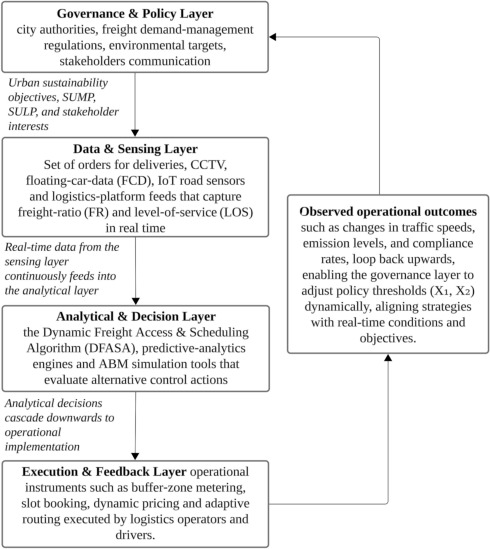Sustainable management of urban logistics (UL) is becoming increasingly urgent as cities grapple with rising congestion, worsening air quality, and growing e-commerce demand. Traditional freight management models—largely static and inflexible—struggle to cope with dynamic urban environments. A new study by Galkin, Švadlenka, Vrba, and Kijewska (2025) proposes a Dynamic Freight Management (DFM) framework that uses real-time data and adaptive traffic policies to transform how goods move through cities.
At its core, the DFM framework integrates real-time traffic monitoring, adaptive scheduling algorithms, and multi-stakeholder collaboration. Instead of fixed delivery schedules, DFM dynamically adjusts routes and time slots based on current traffic conditions, thereby reducing congestion, emissions, and delivery delays. This approach bridges a critical gap between logistics operations and urban traffic policies, offering a more responsive and sustainable management tool for city planners and logistics providers.
The authors tested their framework in Pardubice, Czech Republic, providing one of the first experimental applications of DFM in a mid-sized city. Simulation results are promising: applying moderate dynamic thresholds—such as limiting freight share to 10–15% of traffic and setting speed thresholds at LOS D (20 km/h)—can reduce NOx and CO emissions by up to 20 percent per day while preserving delivery reliability. Network resilience also improves, as adaptive curbside management, off-peak booking systems, and strategically located parking buffers smooth peak pressures on urban roads.
From a policy perspective, the study calls for adaptive regulatory frameworks. Municipalities should formalize threshold values in their urban codes, invest in real-time sensing technologies such as telematics, CCTV, and floating car data, and launch pilot programs in collaboration with logistics stakeholders. Engagement and transparency are vital: operators may initially resist schedule changes or added compliance costs, so phased rollouts and incentive structures are recommended.

However, challenges remain. The framework requires an upfront investment in digital infrastructure, robust data-sharing agreements that respect privacy, and stronger collaboration between the public and private sectors. The Pardubice case demonstrates feasibility but also highlights the need to test DFM in larger and more complex cities. Electric and autonomous vehicles could significantly alter future congestion dynamics.
The authors recommend future research in multi-city longitudinal evaluations, integration with emerging vehicle technologies, and the application of machine learning for predictive demand modeling. Taken together, these efforts could ensure that urban freight systems remain efficient, resilient, and sustainable even as demand continues to grow. This study represents a significant step toward data-driven, adaptive freight management, offering cities a practical pathway to meet climate goals, improve liveability, and future-proof their logistics networks.
Reference:
Galkin, A., Švadlenka, L., Vrba, R., & Kijewska, K. (2025). Navigating the future of urban logistics: Conceptual framework for Dynamic Freight Management. Transportation Research Part D: Transport and Environment, 147, 104956. https://doi.org/10.1016/j.trd.2025.104956
